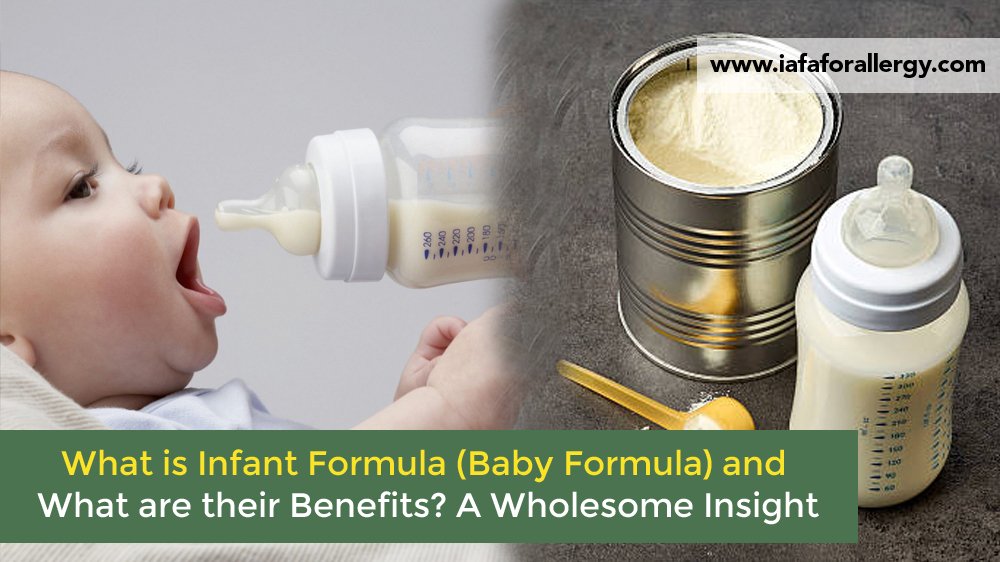Infant formula or baby formula is the milk that is artificially produced by using cows’ milk whey, casein protein and other ingredients to feed the newborn. Even if the infant formula is prepared using the best nutritious ingredients, it can’t compete with the natural breast milk of a mother. Breast milk contains antibodies, immunoglobulins and other nutrients which can’t be found in cows’ milk. Mother’s milk is best suited for the needs of a newborn. It provides immunity against diseases and helps in building a proper digestive system. Newborn requirements can’t be fulfilled with cows’ milk. So, it is always recommended that breast milk is the best for infants.
What is Infant Formula?
Infant formula, aka known as baby formula, false milk, or first milk, is the manufactured food designed for infants under 12 months of age. It is usually in the powdered form which is mixed with warm water or any liquid as prescribed by the paediatrician in the form of a bottle feed. It acts as a substitute for breast milk.
Who Can be Given the Infant Formula?
- If the mother of the newborn is unable to deliver breast milk, then the baby can be fed with infant formula.
- If the newborns are of very low birth weight, they may be unable to suckle the milk from a mother’s breast, so those infants can be fed with baby formula using a spatula, a paladai or tube fed.
- Those infants who can’t have breast milk due to the above-mentioned reasons and are allergic to cows’ milk can be fed baby formula.
- Infants with congenital disorders and those whose brains are underdeveloped are unable to suckle breast milk, so they can be fed with infant formula.
- Infants with severe disorders, unconscious and who are kept under supervision at ICUs can be fed with baby formula for some days, and after they are recovered can be given breast milk.
Ingredients of Infant Formula
Ingredients vary from brand to brand and also from one country to another country but most of baby formulas contain the following ingredients:
- Processed skimmed cows’ milk whey.
- Casein protein.
- Vegetable oils are used as fat.
- Emulsifiers to make the oil mix up with the water when mixed.
- Stabilisers to stabilise the formula.
- Carbohydrates like lactose and those with lactose intolerance can choose the baby formula with maltodextrin as a carbohydrate source.
- Vitamins and minerals like iron, calcium, and magnesium.
How is it Prepared?
Baby formula manufacturing undergoes a stepwise process involving:-
- Mixing the ingredients
- Pasteurization
- Homogenization
- Standardization
- Packaging and
- Sterilization.
Is it Safe to Use?
Baby formula is not as safe and effective as breast milk.
One must remember the following cons when they are feeding their babies with infant formula:
- The baby formula doesn’t contain the antibodies and immunoglobulins as breast milk and does not provide effective immunity against diseases.
- Plastic bottles and rubber nipples are not safe to use in the long run and are a little bit expensive.
- Milk bottles and nipples must be changed often and must be sterilized properly.
- The baby formula must be mixed properly to cope with the optimum temperature.
- Infant formula can cause digestive issues like bloating and constipation.
Final Verdict
No matter how much the baby formulas are manufactured in a way to match human milk, they can’t provide all the nutrients and antibodies as breast milk does. Infants who are fed with breast milk are more immune to diseases and have good brain development. Many brands use A1 milk as a source of whey and casein protein, which again a viruddh aahar resulting in various allergies and other digestive issues.
These articles are written to bring awareness about the foods that are given to infants to prevent various allergies and health issues. Your health is our priority, have a look at our similar articles to get a glimpse of what you are feeding your newborn, and do let us know your thoughts and suggestions regarding the same.
About IAFA
In case anyone suffering from any kind of allergies like food allergies, nasal allergies, skin allergies, cows’ milk allergies, and food intolerance, get an online consultation now with Dr. Sahil Gupta, who’s an ayurvedic allergy specialist with hands-on experience of treating various disorders with the use of ancient ayurvedic herbs and ayurvedic recommended personalized diet.









